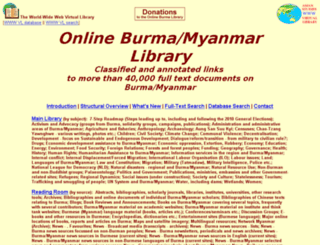Focal point
Location
The Online Burma/Myanmar Library (OBL) is a non-profit online research library mainly in English and Burmese serving academics, activists, diplomats, NGOs, CSOs, CBOs and other Burmese and international actors. It is also, of course, open to the general public. Though we provide lists of Burma/Myanmar news sources, the Library’s main content is not news but in-depth articles, reports, laws, videos and links to other websites, We provide a search engine (database and full text) and an alphabetical list of categories and sub-categories, but the Library is best accessed through browsing the 100 or so categories which lead to sub- and sub-sub categories. These tools should be used in combination.
Members:
Resources
Displaying 1081 - 1085 of 1151Land Confiscation reports on the KHRG site
Land confiscation is narrowly defined by KHRG as incidents in which villagers’ access to or use of land is forcibly supplanted by another actor without their consent. Land confiscation often occurs at proposed development, natural resource extraction, or private business sites, including hydro-electric dams, mining and logging projects, and plantation agriculture. Increased militarisation at these sites perpetuates a cycle of land confiscation in areas adjacent to the sites for the development of military camps, roads, or other infrastructure to support the project.
Minority Rights International
Minority Rights Group International campaigns worldwide with around 130 partners in over 60 countries to ensure that disadvantaged minorities and indigenous peoples, often the poorest of the poor, can make their voices heard. Through training and education, legal cases, publications and the media, we support minority and indigenous people as they strive to maintain their rights to the land they live on, the languages they speak, to equal opportunities in education and employment, and to full participation in public life.
Forced relocation: Declaration of the Rights of Persons Belonging to National or Ethnic, Religious or Linguistic Minorities
Articles 3, 4 ... ADDITIONAL KEYWORDS: forced resettlement, forced relocation, forced movement, forced displacement, forced migration, forced to move, displaced
Myanmar profile - natural resources
Myanmar's natural resources include gems, industrial minerals, oil, and offshore natural gas reserves estimated at 10 trillion cubic feet. The extractive sector accounted for 39 percent of exports in 2010, yet despite its mineral wealth, Myanmar is one of the least developed nations in the world. Its extractive industries are infamously opaque. In the April 2012 elections, the main opposition party won seats in the parliament, a development that could lead to improved transparency...
Publications on "Access to land"
Appetite for land" (pdf, 225 KB) Large-Scale Foreign Investment in Land
Available in German (pdf, 265 KB) and French (pdf, 270 KB)


